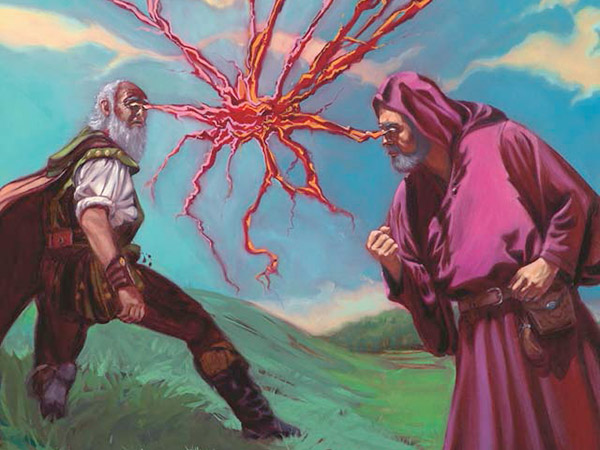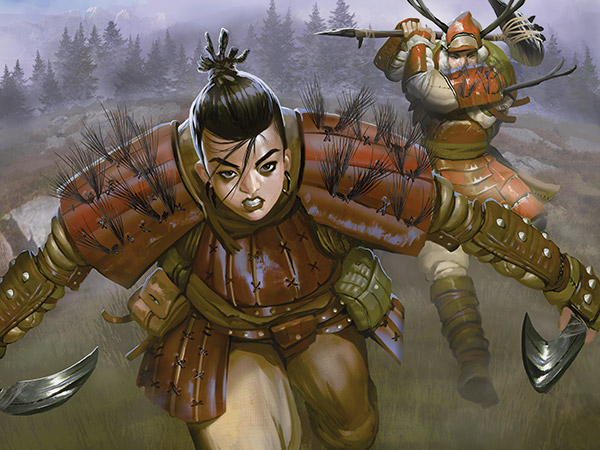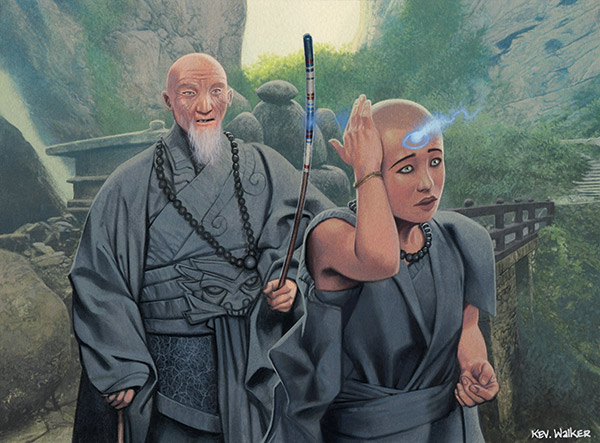Playing From Ahead, Playing From Behind
Most people play their best in close games. I see it in myself; I see it in other people; I see it in Magic; I see it in virtually every aspect of life. Fierce competition and a hard fight bring out the best in us. It's part of what's allowed our species to survive on Earth for so long! It's a heart-warming testament to the human spirit! Right?
…Right?
Well, put a different way, most people play their worst when games aren't close. They either lose hope or they give up completely when things look bad. They get overconfident and careless when everything seems to be going their way. So sure, trying your hardest when things are close might be good for a caveman fighting sabertooth tigers, but it's quite a self-destructive quality in a Magic player.
When you're behind, you need to give yourself every chance to steal a win. When you're ahead, you need to stay tight and close the door on your opponent.
If you can come back to win one out of a hundred games that look hopeless, you'll be a better Magic player for it. If you allow one out of every hundred would-be wins to slip through your fingers, your chances of winning tournaments will plummet.

Mages' Contest | Art by Bradley Williams
Playing From Behind
I'd like to share with you one of the most exciting moments in the history of the Magic Pro Tour:
Craig Jones, playing an aggressive deck with burn, finds himself in a losing position against Olivier Ruel, with the game slipping away from him with each passing turn. Listen to what the commentators say when Craig draws Char. One of the commentators wants Craig to make the obvious play of taking out his opponent's best creature. The other, however, advocates the bold play of firing Char directly at Ruel. Mr. Jones decides on the latter, and the rest is history.
Playing to Your Outs
Looking at that momentary snapshot of the game, burning the opponent's creature seems like a good play. However, Craig Jones was very far behind in the game, and making that play would've still left him in a losing position. It would've served to postpone the inevitable for a few turns, but he would've lost the game regardless.
When Captain Blackbeard is making you walk the plank, do you really care how long the plank is?
Instead, Craig thought through his possible paths to victory, and decided that this moment was do or die. His odds were slim, but slim odds are always better than a guaranteed loss. He cast Char on his opponent, and he drew Lightning Helix to deal the last 3 points of damage. This is called playing to your outs.
An out is a card or situation that you need to show itself in order for you to win. When you're losing a game, your focus needs to change from simply making obvious, sensible plays, to considering your outs. Figure out what your outs are, and play assuming that one of them will come up. If you successfully draw the card you need, you want to be in the best possible situation to take advantage and turn a loss into a win. If you don't, then the outcome will be the same as it would have been otherwise.
In other words, say you're losing and the only way you can come back is if something specific happens—you draw End Hostilities on your next turn. You can consider four different paths the game can take.
- You play normally. You don't draw End Hostilities. You lose.
- You pretend as though you're definitely drawing End Hostilities next turn. You play in a way that will leave you in the most favorable possible position if you do. You hold a creature in your hand, and you chump block your opponent's 4/4. You don't draw End Hostilities. You lose.
- You play normally. You draw End Hostilities. You even up the board but you're at a disadvantage and have a low life total. The outcome is uncertain but you're likely to lose.
- You pretend as though you're definitely drawing End Hostilities and play accordingly. You draw End Hostilities. You even up the board with a higher life total and an extra creature in your hand. The outcome is still uncertain, but you're likely to win.
When you consider these four different paths, it becomes clear that it costs you nothing to play to your out, the End Hostilities. If it doesn't come up, you lose in either case. If it does come up, then you've given yourself the best chance to turn a loss into a win. It doesn't matter whether you have four copies of End Hostilities or only one, if it's your only path to victory, then that's the path you should start walking.
Complicate the Game
Playing to your outs is relatively simple in concept, but can be more complicated in practice. It's rare that there's only exactly one route to victory. When you have more than one out, you have to start asking yourself extra questions like: what are the odds of each occurring and how can you play to maximize both at the same time.
Often, the situation is so complex that you can't see every possibility and can't clearly define all of your outs right away. In this case, you can neither start down a specific path, nor can you continue to play normally, and yet you have to soldier on. In such a situation, my advice is to try to complicate the game state as much as possible.
Complicated situations mean more choices and more possibilities. When you have zero creatures facing down two creatures, there's no room for interpretation—you're losing. When you have two creatures against four creatures, however, you might have some space to maneuver. Perhaps your opponent will make an overly aggressive attack and open up a draw like Become Immense or Rush of Battle as an out. Perhaps they'll play too defensively and give you time to set up Icy Blast or Flying Crane Technique.
When I'm ahead, or when the game is close, I tend to trade creatures at most opportunities. When I'm losing, however, I might be willing to take some extra damage in order to maintain a complicated board state where unexpected things can happen.
Allow Your Opponent to Make Mistakes
We normally think of an out as being a card that we need to draw, but it can take other forms as well. Sometimes, your out will be your opponent making a particular game-play decision.
Say you're behind on the board but you have Trumpet Blast. You can pass the turn, chump block with a bunch of your creatures, and survive one more turn before inevitably losing. Or you can make an aggressive attack. If your opponent blocks in a certain way, you're dead to his or her counter attack. However, if they block the way you want them to, you can cast Trumpet Blast and make some favorable trades, allowing the game to continue.
Don't Concede
Along those lines, don't concede a game of Magic until you're at 0 life. Sometimes you can draw a card or combination of cards that you simply hadn't thought of right away! Sometimes your opponent will make an odd decision that opens the door for you to come back into the game.
Even on the final turn of the game, when you're defenseless against a lethal attack, you should make your opponent turn their creatures sideways. They might decide to play around Kill Shot; they might miscount their damage and hold back; anything can happen!
The only reason to concede a game is to save time or conceal information for a future game. As long as you're still playing, you always have some chance of winning the game. If you concede, you have no chance of winning.
Playing From Ahead
Losing hope when you're behind is a sure fire way to lose a game. Overconfidence when you're winning can be just as deadly.
My advice for playing from ahead is going to be the mirror image of my advice for playing from behind. However, that might not be quite as simple as it sounds.

Press the Advantage | Art by Marco Nelor
Think from Your Opponent's Perspective
When you're winning, your focus should turn to the ways you can lose the game. Just as you consider your outs when you're behind, when you're ahead you should consider the possible cards or events that would reverse the situation. The best way to do this is to put yourself in your opponent's shoes, and consider what they're probably hoping for. Remember that if your opponent has not yet conceded, they're still trying to beat you! You need to stay one step ahead.
So what's your opponent's plan for beating you? Perhaps they're trying to get in a couple more points of damage, and then draw a burn spell. If so, then you should go out of your way to protect your life total. When you're winning, you have resources to spare, so you can sometimes afford to make otherwise-unfavorable trades and blocks if it means closing a door on one of your opponent's paths to victory.
Similarly, if it seems the only way your opponent can possibly come back is with a board sweeper like End Hostilities, then the situation is the exact reverse of playing to your outs. In this case you're protecting yourself from your opponent's outs. You'll win either way if they fail to draw End Hostilities, so you might as well pretend that they're going to draw it. Hold creatures in your hand, and maximize your chances of coming back if your opponent is fortunate enough to draw the card they need.
Simplify Things
As I mentioned above, when I'm winning I like to trade creatures and resources whenever possible. A simple game is a controlled game and a predictable game. In such a case, your advantages are more likely to remain advantages.
Consider also how an advantage is magnified when both players have fewer resources. Say your opponent mulligans down to five cards. On turn five of the game, you'll have eleven cards to their nine—this might not seem like a huge difference. However, if you've succeeded in trading for his or her first creature in combat, using a removal spell on the second one, and casting a Thoughtseize, now both players have fewer resources. Now you have eight cards left to work with and your opponent only has six. Your advantage has become both easier to identify, and far more important to the outcome of the game.
Don't Worry About Slowrolling
"Slowrolling" is a strange concept that's developed in Magic culture. To "slowroll" means to hold onto the game-winning card for longer than you need to, instead of casting it right away. For example, if you're at 3 life and I draw Lightning Strike, I either show you the card right away or else I'm "slowrolling."
The idea is that when the winner slowrolls, it makes the loss more painful for the person on the receiving end. Some players get angry when they feel their opponent has slowrolled them. I've always found this to be a strange and harmful attitude within the Magic community.
Of course, it's absolutely unacceptable to slowroll with the intention of causing your opponent mental anguish. However, this is virtually never what actually happens. For every ten thousand players who get mad about being slowrolled, I'd be surprised if even one of their opponents had done it maliciously.
It's silly to get mad about a slowroll, and it's silly to worry about hurting someone's feelings by slowrolling. Quite frankly, it's a horrible idea to ever rush the final turn of a game!
Okay, I drew Lightning Strike and you're at 3 life. Okay, I'm likely to win the game, but what might go wrong? Could you have a permission spell? Could you have a way to gain life? Have I forgotten that you have a Windswept Heath in play with two Courser of Kruphixes? It's completely unacceptable to blunder when you're so close to a win. You should always take your time and make sure you execute your plays in the best way you can, particularly if it's on the deciding turn of the game.
Erase "slowroll" from your vocabulary, and don't worry about how much time you take to make your decisions on the final turn of the game—I never do. If your opponent gets angry with you, that's their fault, not yours. When you play a Magic tournament your goal is to play the game the best you can, and give yourself the best possible chance of winning. So long as you treat your opponent with respect and are not rude in other aspects of the game, then they're not justified in getting mad about a slowroll.
Sometimes, if I feel like being especially considerate about not slowrolling, I'll say something like, "I think I might be able to win, but I'm still thinking it through." But even that is going above and beyond the call of duty. Just focus on your own game, and do what you need to do.

Refocus | Art by Kev Walker
Stay Focused
In the very first article I wrote for Level One, I named "focus" as the most important skill for a Magic player to cultivate. Focus is what allows you to stay present in the game, minimize your number of mistakes, and see what you need to do in order to win.
Being far ahead or far behind in a game are circumstances that often cause players to lose their focus. Recognize if this is happening to you, and do everything you can to correct it. Playing to your outs is a very important skill in Magic, and so is being able to close out a game safely and efficiently.
Everybody loves a great comeback story. Work on these skills and you'll be on the winning end of those great comeback stories as often as possible.

